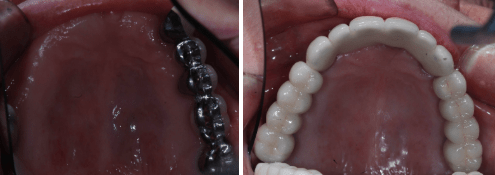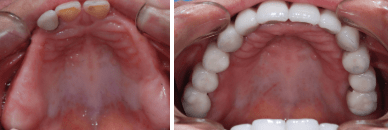Book your next appointment with us
If you have any additional questions about your treatment options, or you want to learn more about our services, we made a page to help guide you. Visit our FAQ page for support and helpful resources.
Good News! VCCID has partnered with Dental Card. Get up to $25,000 in financing for dental treatments.
Find the answers to commonly asked dental implants questions!
A dental implant is an artificial tooth root that is anchored in your jaw to hold a replacement tooth, bridge or denture in place. Implants are made from titanium alloys and bone-like ceramic materials that are biocompatible with body tissue. This is important at VCCID because we take a holistic approach to dentistry. Dental implants act as an anchor to provide a solid base for artificial tooth replacement. Here’s a video overview of dental implants. You can also visit our dental implants page for more information.

There are many advantages to dental implants. They can be used to replace a single missing tooth, or replace several teeth, depending on what is needed. Dental implants can solve multiple different tooth replacement requirements.
Implants can:
Most dental implants have ten-year success rates, up to 98%. To put this in perspective, traditional crowns and bridges and root canals only have a ten-year success rate of 85%. Many medical procedures have ten-year success rates of only 75%.
With ideal and proper treatment planning, performing surgery following accepted rules of practice, having the prosthesis fabricated correctly, and finally proper patient maintenance, you can expect success rates in excess of 98%. Dental implant complications are rare with a proper treatment plan.

There are many benefits to dental implants. Patients are able to eat better, enjoying foods once denied them with dentures. They are more comfortable when they eat and don’t have to use adhesives to retain their dentures. They also say they can talk and laugh without feeling self-conscious and without fear of their dentures slipping out.
In short, they feel better about themselves, showing self-confidence and improved social and business lives. Apart from being able to smile, eat, sing, and speak better; dental implants prevent the onset of a poor facial profile due to loss of bone mass in the jaw bone when teeth are missing. Implants are well known in their ability to stop bone loss and maintain the facial skeletal structure. More benefits. Here’s a video explanation of the benefits of dental implants.

After implant surgery, the gums and mouth need time to heal before a crown or prosthetic tooth is placed. You are still able to use a denture during the healing period. We can always make provisions to have temporary teeth made. In some cases where dentures are worn, we ask patients to wear their dentures part-time if possible during the initial healing period (3-14 days). Here are some additional tips on how to recover from dental implant surgery.
The popularity of implants has largely been the result of people living longer and their desire to fulfill a lifestyle with the greatest possible pleasure. Implants give us the ability to restore something that is fundamental: the ability to eat confidently and comfortably.
More and more people with missing teeth realize they do not have to suffer. Almost everyone wants to smile more frequently and feel secure when they talk and laugh. Dental implants allow you to do everything you want with total self-assurance.

No! You normally do not need an implant for each missing tooth. However, it is certainly possible to get a full mouth of implants. It is very important, however, that the number of implants is adequate to support the type of teeth and the biting forces being placed on them. In some situations, only 1 or 2 implants may be required, others may require up to 8 implants for an entire arch. Bridges are used when there are several teeth missing, so the implants placed are simply used to stabilize and support the bridges.
There are few things in life that last a lifetime and dental implants are no different. The experienced implant dentist expects success rates in excess of 98%. Should a problem arise, it normally does during the first six months to a year following surgery, during the period of bone healing. After this period, problems are less frequent. Here’s information on the long-term success of dental implants. Dental implants are the most permanent solution to tooth loss, so even though they don’t last a lifetime, they are still the closest you can get to natural teeth.
There is no comparison. Comparing a denture to implants is like comparing a prosthetic arm to a real one. The improvement in comfort, function, health and self-confidence is incomparable. Dental implants enhance quality of life in a way that dentures can’t. Dentures however are useful as temporary tooth replacement. Here is our full article about dental implants vs dentures.
Dentures rely on suction to hold them in place. Lower dentures tend to float due to little suction, allowing food and seeds to get under them while eating and causing sore spots. In addition, the floor of the mouth, as well as the tongue moves whenever we eat, speak or simply swallow. By placing as few as two implants in the lower jaw, implants can secure the denture by reducing its movement and preventing it from “falling out,” By placing four or more implants, the denture and all the chewing pressure can be transferred to the implants. This is one of the most ideal treatments for a lower denture in that it will eliminate all the problems usually associated with lower dentures.
Unlike the lower denture, suction is not usually a problem with the upper denture. However, upper dentures can interfere with tasting food as well as causing gagging. Implants can allow you to eliminate the palate to increase your sense of taste and eliminate gagging. Implants will also secure your upper denture in the same way that they do a lower denture.
Yes. Many people with dentures who proceed with implants prefer to have permanent non-removable teeth. In other cases, a person might choose to have an overdenture which is removable but “snaps” into place. Both are excellent choices. We would be very happy to review the benefits and differences of each and help you decide which is best for you.

As many as 50% of partial denture wearers are unable to comfortably wear a removable partial denture. Patients complain of the metal bar across the palate or behind the lower teeth. In some cases, the retaining clasps can decay the neighbouring teeth. Implants can eliminate the clasps and the connecting bar and even allow you to have a fixed bridge instead of a removable denture.
Although the first recorded dental implant is over 2000 years old, implants became a viable alternative to lost teeth 50 years ago when a major breakthrough occurred with the use of titanium and its alloys. A further advancement 15 years ago – the use of synthetic bone coatings on titanium implants – has produced a stronger, quicker attachment to the bone.
The oldest patient Dr. Balogh has treated was 85 years young and the youngest 17. Patients healthy enough to undergo a routine dental extraction are healthy enough to have dental implants placed. The most common disease to contra-indicate the placement of implants is uncontrolled diabetes, however, Dr. Balogh has placed many successful implants in diabetic patients. The important factor is to have your diabetes under reasonable control so that healing is not impaired.

Although an exam, radiograph, or CT scan may be necessary to evaluate the amount of bone present, most patients have enough bone for the placement of implants. The longer a person has been missing teeth, the greater the amount of bone loss or atrophy that will have occurred. Sometimes insufficient bone will require the placement of a bone graft before implants are placed.

If you have insufficient bone, we can add new bone. At one time, the only bone available to us was from the patient’s hip or ribs. Today we have a choice of over 30 different types of bone from a number of sources. As well, most bone augmentation procedures are simple, atraumatic and successful.
Yes, the jaw bone will atrophy as soon as a tooth is removed. By placing an implant the bone is stimulated to be maintained. The bone will not atrophy anywhere that an implant is placed.
Yes. In some cases, we can remove a tooth, place an implant as well as place a crown or bridge the very same day. We can discuss your situation to see if you would be a good candidate for this type of procedure.

No. Most dental implant procedures are equivalent to a tooth extraction and are performed in the dental chair under local anesthetic (freezing).
The discomfort experienced after the placement of implants is generally equivalent to that experienced from the extraction of a tooth. Most implants are placed using local anesthetic. Sedation is available, and is often recommended for extensive procedures or for anyone anxious about dental procedures. The techniques, medications, and procedures used in the placement of implants are designed to help you avoid pain and discomfort. A simple implant placement usually only requires the use of Ibuprofen (Advil/Motrin) for discomfort. Here’s more information on whether getting dental implants are painful or not.
The entire process typically involves 2 or 3 trips to the dentist over a 4 to 5 month period. During that time period, the patient is only in the dental chair for about 45 minutes each visit. Please note that each patient heals differently, so time may vary. Here’s more information on what’s involved in getting dental implants.
In most cases, you can resume normal activities the day following the placement of your implant. In those cases where extensive surgery is performed, you may require 3 or 4 days to resume normal activity. Here are our top tips for recovery after dental implants.
Yes, it is normal to have some level of anxiety towards dentists. Most dental fears are related to an early experience during our childhood. Today’s dental practices are capable of assisting you in dealing with those fears through sedation dentistry.
Dental implants do not suffer from normal teeth problems such as decay and hot/cold sensitivity. All that is needed is normal brushing and flossing along with your periodic check-ups.

Implants will allow you to enjoy foods like corn and apples – food that you may have avoided for years. Implant supported dentures and bridges can increase your biting force more than 10 times (compared to dentures) allowing you to eat any hard food that you were once able to with your original teeth.
The fee for placement and fabrication of the overlying prosthesis (crown, bridge, denture) varies. The more implants that are required the greater the cost. Another factor in cost is the type of replacement that is required. In many cases involving dentures, the patient’s existing denture can be used. You will be informed of the total treatment fee at your initial consultation. All dental implants are tax deductible. Learn more about the cost of dental implants in Vancouver.
Coverage of each dental plan varies from plan to plan. As a general rule, all plans cover the initial consultation, radiographs and any other planning costs. In Canada, only a few plans pay for the placement of implants although in the USA, many plans now provide coverage. Most insurance plans cover a percentage of the crowns, bridges and dentures over implants.
Yes. We do everything we can to make your dental treatment affordable. For treatments lasting several months or more, we break down the fees over the course of treatment. Visit our financial policies page to learn more about payment options.
There are many people who have sensitivities to metals. Nickel is a fairly common allergy affecting ~5% of the population. Others have some sensitivities which may not be a true antibody antigen type allergy. These people cannot wear any jewellery with less than 18 karat gold.
Sensitivity to titanium is even more rare, but it does exist. Some titanium implants are made from pure titanium, while most are an alloy (to make them stronger). So if you have any concerns you can get a test done to determine if you have any sensitivities to titanium. Two available tests are a Melisa test or a Clifford’s test. Most naturopaths and some dentists can arrange this test for you.
If you do have a sensitivity you may be a candidate for a zirconia implant. At VCCID we take a holistic approach to dental care and we understand the need for non-metallic implant alternatives. These are considered non metallic, ceramic type implants. Although not as well known, they have been in clinical use for ~15+ years and they are also excellent choices for tooth replacements.

Dental implants provide a safe foundation to fix or replace teeth, and they’re also a great option for people with missing teeth.
Why? Well, as much as a person’s teeth influence how they look, teeth are also a critical part of how the mouth moves while chewing or speaking. If a tooth is missing or misaligned, the remaining teeth will naturally shift and experience greater pressure, which can lead to further tooth loss in the future. This can rapidly spiral towards having no teeth at all, and might eventually make dentures a necessity. To make matters worse, tooth loss can also lead to bone loss, making implant solutions more complicated and expensive.
So, if you have one or more missing teeth, or have some issues with the alignment of your teeth, dental implants may be right for you. They’ll improve your smile, self-esteem, speech, and comfort while improving your general oral health.
Compared to other dental procedures on the market, implants provide a number of advantages.
Since they’re permanent and durable, implants are a cost-effective long term solution. They also require relatively little maintenance, which helps to minimize recurring costs.
Implants aren’t just good for your pocketbook either. They can typically be placed without any modifications to adjacent teeth, so they provide a natural and comfortable fit while also looking and functioning more like regular teeth.
Generally, it’s better to avoid placing implants while the jaws are still growing, so we typically advise younger patients to wait until they’re at least 18 years old before receiving dental implants.
Having said that, not everyone matures at the same rate. For example, girls mature earlier than boys, and their jaw growth generally finishes a year or two earlier, so – for example – a 17 year old teenage girl may be able to safely receive dental implants.
It’s always best to seek out a clinical evaluation if you’re considering any kind of dental procedure, and it’s especially important for minors. A dental professional will be able to assess factors like teeth alignment and/or bite, and can help plan a schedule if other operations like braces are being considered.
This is a question we get all the time – how much do dental implants cost? Everyone’s mouth is different, but here’s the quick answer: Implant treatment costs vary – from under $4,500 to well over $20,000, but they’re generally among the most costly dental procedures that a person can have.
We understand that those amounts represent a sizable financial outlay for most people, which is why we always encourage our patients to do their due diligence and take time to understand what they’re paying for and why they’re paying for it.
If you’d like to get more detailed information about your case specifically, fill out the form on the right or call the phone number at the top of this page to book an appointment with Dr. Balogh.
Implant treatments vary widely based on factors like which materials are used in an operation, how much work is being done, what dental needs a patient has, or how much a dentist charges for their time, which is why it’s important to request an estimate that includes the total cost of completing a treatment.
But it isn’t just treatment costs and patient specifics that vary – clinics often have their own way of presenting estimates too. Some estimates may be given as a “cost-plus,” meaning that there may be a clinic fee in addition to separate material and laboratory costs; in other cases, dentists who provide quotes don’t include the cost of additional work you may need, such as bone grafting. In these scenarios, you could end up paying much more than you anticipated for your new smile.
Unlike many other dental clinics, VCCID presents fixed estimates that include all the costs of completing a treatment from beginning to end. Additionally, we handle all aspects of treatment in our offices. This results in lower costs and less stress for our patients, since only one dentist is needed.
As an experienced dental clinic, we are very precise in our estimates, and in the rare cases where our estimates are off, we bear the responsibility, not our patients. Once you come in for a consultation with Dr. Balogh, he’ll be able to assess your dental implant needs and provide you with an estimate of how much a procedure would cost.
Although implant dentistry has been around for over 50 years, there is a very wide range of training, knowledge and experience among implant dentists. Some dentists either do not perform the surgical procedures or their surgical skill may be limited so they will refer you to an oral surgeon or another implant dentist with greater surgical experience.
Unless a person has a serious medical condition that will prevent them from healing properly, it’s usually possible for them to receive implants. We’ve had patients who were previously told they didn’t have enough bone for implants, and yet with the right techniques and some careful adjustments to their treatment plan, we were able to successfully fit them with implants.
Depending on how severe it is and how well it is has been controlled, gum disease can be a factor when having implants placed since it can lead to infection and implant failure.
If possible, it’s typically better to address the gum disease and establish a good oral hygiene routine first, then proceed with the placement of implants.
If you struggle with teeth grinding you can still get implants, although some alteration in the treatment plan may be required. For example:
As always, each case is different, but these are just a few of the things that we can do to ensure the long term success of implants on a patient with bruxism.
The main factor for diabetics is how well their diabetes and blood sugar are being controlled, although we do recognize that there can be considerations in terms of their healing and immune system as well.
When performing either bone grafting or placed implants, we haven’t seen any issues with our patients who are diabetic. Nevertheless, we take our all our patients’ concerns seriously, and may alter treatment slightly by approaching things a little slower or doing larger procedures in phases if we feel that such steps are necessary to maintain safe blood sugar levels.
There are many people who are sensitive to certain metals like nickel or lower-karat gold. Titanium sensitivity is rare, so that metal is used in many cosmetics, toothpastes, and even certain foods. Chances are, you’ve probably already had some titanium exposure in the past.
Since titanium sensitivity is rare, many dental implants are made from either pure titanium or titanium allow. Nevertheless, it’s always better to be cautious. If you have any concerns about titanium sensitivity, you can ask a dentist or naturopathic doctor about receiving a Melisa test or a Clifford’s test. Either test should reveal if you have any sensitivity to metal.
If you are sensitive to metal, you might consider choosing zirconia implants, which are non-metallic, ceramic type implants. They’ve been used in clinics for more than 15 years and are also an excellent choice for tooth replacements.
Different materials are used depending on which is procedure being performed, as well as personal factors like what material a patient’s body will accept, what appearance they want their implants to have, or how much they’re willing to spend.
For example, we often recommend that crowns be attached to abutments – the part of the implant that connects the crown to the screw – which are made of gold or titanium. In our experience, ceramics are thinner and more prone to fracturing, so that knowledge guides our decision of which material to use for abutments. Learn more about Types of Dental Implant Materials — Titanium vs Zirconia
We’re always happy to explain what different options are available to our patients, so we’d encourage you to book an appointment with us or send us an email at info@vccid.com so we can help you to understand which material is right for your needs.
Sometimes prior dental procedures or infections can prevent successful placement of an implant, and in rare cases, implant breakage can occur.
The good news is that, in most cases, proper cleaning of the implant area and sufficient healing time for the patient are enough to allow for subsequent implants to be placed successfully.
Sometimes the metal of the implant can be visible, but be careful not to confused the implant with a temporary post or healing collar that has been placed after surgery.
If there is visible metal, that isn’t necessarily a problem either. Some implants have a smooth surface at the top which is meant to stick above the gum tissue, so it could even be perfectly normal and correct.
If it’s the body of the implant – the part that’s meant to be buried and covered by bone – showing through, then that may lead to plaque accumulation on the rough surface of the implant body, which wouldn’t be healthy in the long term. However, even that can be addressed in most cases, allowing the implant to be saved and maintained.
Generally, we advise our patients not to think of the two types of implants in terms of “which one is better”. It’s more helpful for a patient to think about their own oral health needs and try to answer the question “which one is right for me?”
There are benefits and limitations to each implant material, so the best thing a person can do is conduct their own research, consult with dental professionals, and make an informed decision about which implant material to select. Looking for a place to start? Visit our zirconia implants page here.
Titanium implants were originally out of pure titanium, but those implants weren’t durable enough, so manufacturers mixed other metals with titanium to create titanium-alloy implants. These days, nearly all “titanium” implants are made from a titanium alloy, but they’re still referred to as titanium implants.
It’s a similar story between ceramic implants and zirconia implants. Zirconia is a type of ceramic material, so some people refer to them as ceramic implants but both terms refer to the same type of implant.
So, really, there are just two types of implants: titanium implants and zirconia implants. You can find out more about the differences between these two types of implants here.
If you have any additional questions about your treatment options, or you want to learn more about our services, we made a page to help guide you. Visit our FAQ page for support and helpful resources.
Metropolis at Metrotown
4800 Kingsway #359, Burnaby
BC V5H 4J2, Canada
MON: 8 AM – 5 PM
TUE: 7 AM – 5 PM
WED: 9 AM – 8 PM
THUR: 7 AM – 7 PM
FRI: 8 AM – 5 PM
SAT: 8 AM – 4 PM
*Closed statutory holidays
Subscribe to our email to get updates from the clinic and the latest content we publish
Internet Marketing by ElementIQ